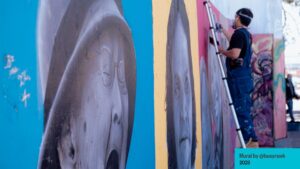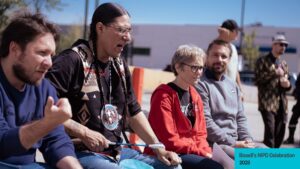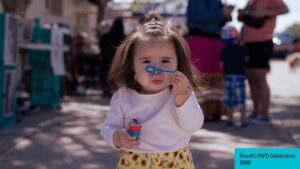Honouring the Pride Woven into Indigenous History
June is an important month for Bissell Centre – it’s both Pride Month and National Indigenous History Month. There is a close connection between what Pride Month is all about and Indigenous history in our country.
Countless Indigenous Nations across what’s now called North America saw Two-Spirit Peoples as not only an engrained and normalized part of their culture — Two-Spirit Peoples were often highly regarded and seen as a gift from the Creator.
“They were a very important part of Cree society,” says Elder Ed Lavallee. He is a traditional Plains Nehiyaw (Cree) of the Sturgeon Lake First Nation in Saskatchewan whose career in advocacy for Two-Spirit Peoples has seen him collaborate with groups like Pride Edmonton, the Edmonton Queer History Project, and the Edmonton 2 Spirit Society. Quotes from Elder Ed Lavallee reflect the distinct experience of the Plains Nehiyah Peoples.
“They had many roles in the daily lives of their people and were respected and revered for being Two-Spirited. They were often healers, shamans, mediators in marriage and tribal disputes, keepers of their history and their lore, and taking part and often leading in their social and Spiritual Ceremonies.”
While colonial efforts tried to wipe out any non-conformity from a person’s ascribed gender, the presence of these folks never went away. It wasn’t until 1990 that this way of being was finally given a general English translation to help people across Canada understand that, for countless Indigenous Peoples today, there are far more than only two genders.

The Five Genders
For Indigenous Nations in what’s now called Alberta, there are five genders in the community: male, female, male with female spirit, female with male spirit, and transgender.
“Indigenous people believe that both the female and male spirits reside in the body of a Two-Spirit Individual and the degree of dominance of each spirit ultimately impacts the physical, emotional, mental and spiritual identity of each Two-Spirit person,” says Elder Ed Lavallee.
Rather than trying to change people to better fit with the gender they were born with, Indigenous Nations instead made room for these people and ensured they could contribute to the community with the tasks and skills they identified with most.
Males with female spirits could take on cooking and cleaning duties, were widely seen as gifted artists, and some Nations even saw them adopt orphaned children to take on a caregiver role. Females with male spirits contributed by hunting and being warriors. Some Nations saw females with male spirit folks marrying widowed women.
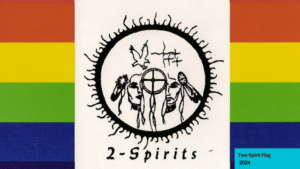
The Reverence for Two Spirit Peoples
In addition to the everyday contributions Two-Spirit Peoples made to their communities, their gift of having two spirits within them also meant they were good healers, medicine people, and visionaries. This is because the two spirits in them give them what’s called double-vision — the ability to see the world through both the male and female lens.
“The belief that Cree Two-Spirit People are special is epitomized in the existence of a powerful Two-Spirit Deity known as Qweskicanskew,” adds Elder Ed Lavallee. “In their spirituality, they believe this Spirit turns things around for the good and well-being of all things on earth. This important Spirit is called upon in prayers for help, protection and blessings.”
Two-Spirit Peoples were foundational to their communities. During colonization, Two-Spirit Peoples’ place in the world seemed to no longer exist. Through the mid- to late-twentieth century, as more Indigenous Peoples began to reclaim their identities, it was clear the different terms used in different Nations like Nádleehí (nad-lay-hee), Winkté (wink-tay), and Niso-acahk-iynew (nee-soh-achak-ee-noo) needed a translation for the wider public to understand.
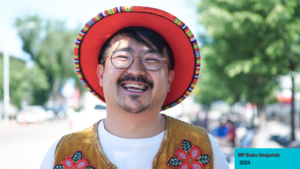
Bringing Two Spirit to the Wider Public
In 1990, at the Third Annual Intertribal Native American, First Nations, Gay and Lesbian American Conference, Elder Myra Laramee put forth the term Two-Spirit. The term is a translation from the Anishnaabemowin (Ojibwe language) term Niizh Manidoowag (neez man-ee-doo-wog). It was added to the front of the Pride acronym (2SLGBTQIA+) in recent years and was even a part of the focus for the Federal 2SLGBTQIA+ Action Plan launched in 2022.
Today, knowledge and understanding about Two-Spirit Peoples is spreading, but is still far behind from where it was before colonization. People like Dr. James Makokis (a Two-Spirit doctor from Kehewin Cree Nation) and MP Blake Desjarlais (a Member of Parliament from Edmonton) are sharing their stories to help more people understand why Two-Spirit Peoples are an essential part of their Nations – and to reduce the stigmatization around people living their authentic lives.
“They are emerging from their long decades of oppression and marginalization working toward re-establishing their rightful roles in their communities as they go through this period of rediscovery,” says Elder Ed Lavalle. “They are working to be recognized, respected and engaged in an integral manner, within Indigenous communities and society in general.”
This Pride Month and National Indigenous History Month, we’re celebrating the bravery of Two-Spirit people coming out and bringing this piece of Indigenous culture to the public forefront. We hope you’ll join us in making room for Peoples who can walk in both worlds to share their gifts and help make this world a more equitable place for everyone.

